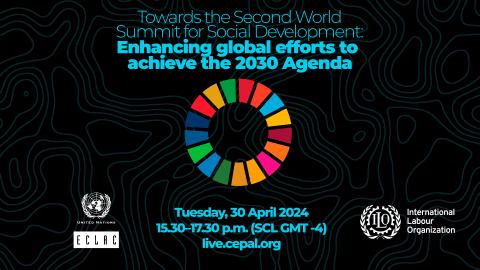Press Release
The evaluation of social well-being requires adding other indicators, including other social inequality indicators, to the Gini index on income. Recognizing and measuring the multiple dimensions of social inequality is a necessary precondition for overcoming the trap of high inequality and low social mobility and social cohesion in which Latin America and the Caribbean is caught and which hinders the region’s progress towards sustainable development, Alberto Arenas de Mesa, Director of the Social Development Division of the Economic Commission for Latin America and the Caribbean (ECLAC), emphasized at the closing session of the Fourth Regional Seminar on Social Development “Social Protection and Inequality: Latin America and the Caribbean towards the Second World Summit for Social Development of 2025”.
“In our region, trying to make high-quality social policies without a metric that reveals the shape and size of social inequality could be characterized as insufficient or, put another way, is like making a journey without a compass or a map. It is essential that we move towards a multidimensional measurement of social inequality in the region,” Arenas de Mesa explained at the event held at ECLAC’s headquarters in Santiago, Chile, using a hybrid format.
The Director of the Commission’s Social Development Division added that “the data, experiences and approaches shared at this Fourth Regional Seminar on Social Development have shed new light on the centrality of treating social inequality as an objective of public policy geared towards inclusive social development.”
Over the course of three days, the gathering drew the in-person and/or virtual participation of representatives of academia, civil society and governments in the region, along with the virtual and/or in-person attendance of the general public, coming from more than 19 countries. On average, there were more than 300 people connected virtually each day.
The objective of the Fourth Regional Seminar on Social Development was to advance in the recognition and analysis of the characteristics and magnitude of social inequality in the region, in the lead-up to the Second World Summit on Social Development, which will take place in 2025.
“The reflections and exchanges over the last three days have shown us the relevance and opportuneness of addressing this issue to strengthen the design of public policies that embrace the aim of leaving no one behind and endeavoring to achieve the Sustainable Development Goals,” indicated Alberto Arenas de Mesa, who edited – along with Claudia Robles, another official in ECLAC’s Social Development Division – the book Non-contributory pension systems in Latin America and the Caribbean: Towards solidarity with sustainability, prepared in the framework of a project with German Cooperation and presented at the regional event.
This is the first book published by this United Nations regional organization to be exclusively focused on the study of non-contributory pension systems in the region.
These systems – as ECLAC’s Executive Secretary, José Manuel Salazar-Xirinachs, indicated at the book presentation – constitute a basic tool for achieving universal, comprehensive, sustainable and resilient social protection systems. “In fact, in the 21st century, non-contributory pension systems have become the cornerstone of social protection systems in Latin America and the Caribbean,” he underscored.
At the Fourth Regional Seminar on Social Development, three keynote speeches were delivered, providing inspiration to the debates on the various thematic panels regarding social protection and inequality.
In the first such speech, Nicholas Barr, Professor of Public Economics at the London School of Economics and Political Science, called for working to develop social protection systems in order to reduce inequality and move towards a welfare state, in view of both their social and economic impacts, and, in that effort, to consider strategic elements such as the strengthening of early childhood development and the protection of persons in their old age.
Later, Professor Sir Michael Marmot, Director of the University College London Institute of Health Equity, stressed the importance of attending to the social determinants of health, not only to guarantee the right to health and reduce inequalities in this area, but also as guiding elements of health policy.
Meanwhile, François Bourguignon, Emeritus Professor of Economics at the Paris School of Economics, addressed the conceptual debates, existing global challenges and proposals for putting a measurement of social inequality into place.
The regional event also featured (virtual) remarks by Ambassador Paula Narváez, President of the United Nations Economic and Social Council (ECOSOC), who called for working to take the region’s message to the Second World Summit for Social Development of 2025, a commitment that ECLAC will carry forward through its Regional Conference on Social Development in Latin America and the Caribbean.



